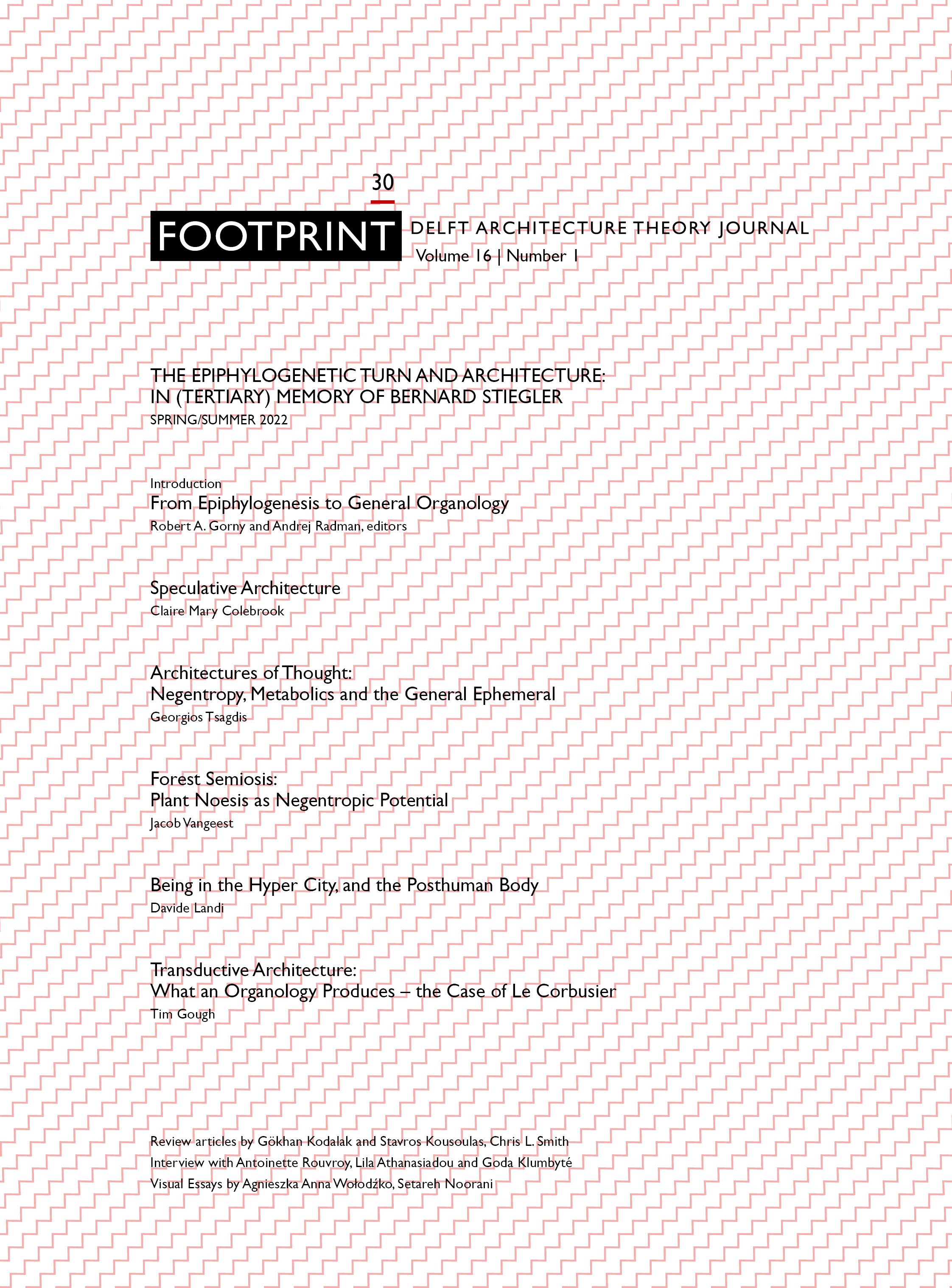Ars Demones *2022* Manifesto
DOI:
https://doi.org/10.7480/footprint.16.1.5974Abstract
Ars Daemones is a manifesto that responds, problematises and encounters conditions and implications of the practice of technologies of spirit as specified in the Ars Industrialis’ two manifesto written by B. Stiegler in 2005 and 2010. Most importantly, the present manifesto focuses on the question of possible conditions and material implications of practice that Stiegler framed within his word of mystagogy. Here, the mystagogy as a knowledge that escapes capture, that demands “contexts, milieus, practices, gestures, rituals, and technologies” is defined as demonology, following G. Deleuze, where both, mystagogy and demonology, call for condition of relationality, movement and an embodied experience. For Stiegler, the knowledge of mystagogy, because of its risky and excessive character, enables to learn and practice care, and it is through the work of art that we can experience of what degrees of care such an excess of another plane need. Through fables of three bodies as experienced through the work of three artists, Ars Daemones will braid material narratives of care. The selection of the three artists, is contaminated by each other by the common question of the risk of care looking for practices of knowledges that rather than survive, would enable to thrive. The manifesto is thus written through the experience of vegetariat present in the work of Špela Petrič, through transbodies and xenologies in space present in the work of Adriana Knouf and through the practice of virophilia in the work of Pei-Ying Lin. Ars Daemones fabulates while experiencing the practices of “I” that is already contaminated and contaminating.
References
Gilles Deleuze, Gilles and Parnet, Claire. Dialogues II, trans. Hugh Tomlinson and Barbara Habberjam (New York: Columbia University Press, 2007).
Knouf, Adriana. ‘Xenological Life Potentials’, in Art as We Don’t Know It, ed. Erich Berger, Kasperi Mäki-Reinikka, Kira O’Reilly, Helena Sederholm (Tallin: Aalto University/Printon, 2020), 42-49.
Londa Schiebinger, Londa. Plants and Empire: Colonial Bioprospecting in the Atlantic World (Cambridge, MA.: Harvard University Press, 2007).
Meeker Natania and Szabari, Antónia. Radical Botany: Plants and Speculative Fiction (New York: Fordham University Press, 2019).
Preciado, Paul. B. ‘Baroque Technopatriarchy: Reproduction’, Art Forum 56, no. 5 (Jan. 2018). Available online at https://www.artforum.com/print/201801/baroque-technopatriarchy-reproduction-73189.
Sandilands, Catriona. ‘Vegetate’ in Veer Ecology: A Companion for Environmental Thinking, ed. Jeffrey Jerome Cohen and Lowell Duckert (Minneapolis: Univ Of Minnesota Press, 2017), 16–29.
Silvia Federici, Silvia and Linebaugh, Peter. Re-Enchanting the World: Feminism and the Politics of the Commons (Oakland, CA: PM Press, 2018).
Stiegler, Bernard. The Re-Enchantment of the World: The Value of Spirit Against Industrial Populism, translated by, Trevor Arthur (London: Bloomsbury Academic, 2014).
Tokarczuk, Olga. Anna In w Grobowcach Swiata [Anna In in the Tombs of the World] (Kraków, 2018).
Downloads
Published
Issue
Section
License
Copyright (c) 2022 Agnieszka Anna Wołodźko

This work is licensed under a Creative Commons Attribution 4.0 International License.
- Authors retain copyright and grant the journal right of first publication with the work simultaneously licensed under a Creative Commons Attribution License that allows others to share the work with an acknowledgement of the work's authorship and initial publication in this journal.
- Authors are able to enter into separate, additional contractual arrangements for the non-exclusive distribution of the journal's published version of the work (e.g., post it to an institutional repository or publish it in a book), with an acknowledgement of its initial publication in this journal.





